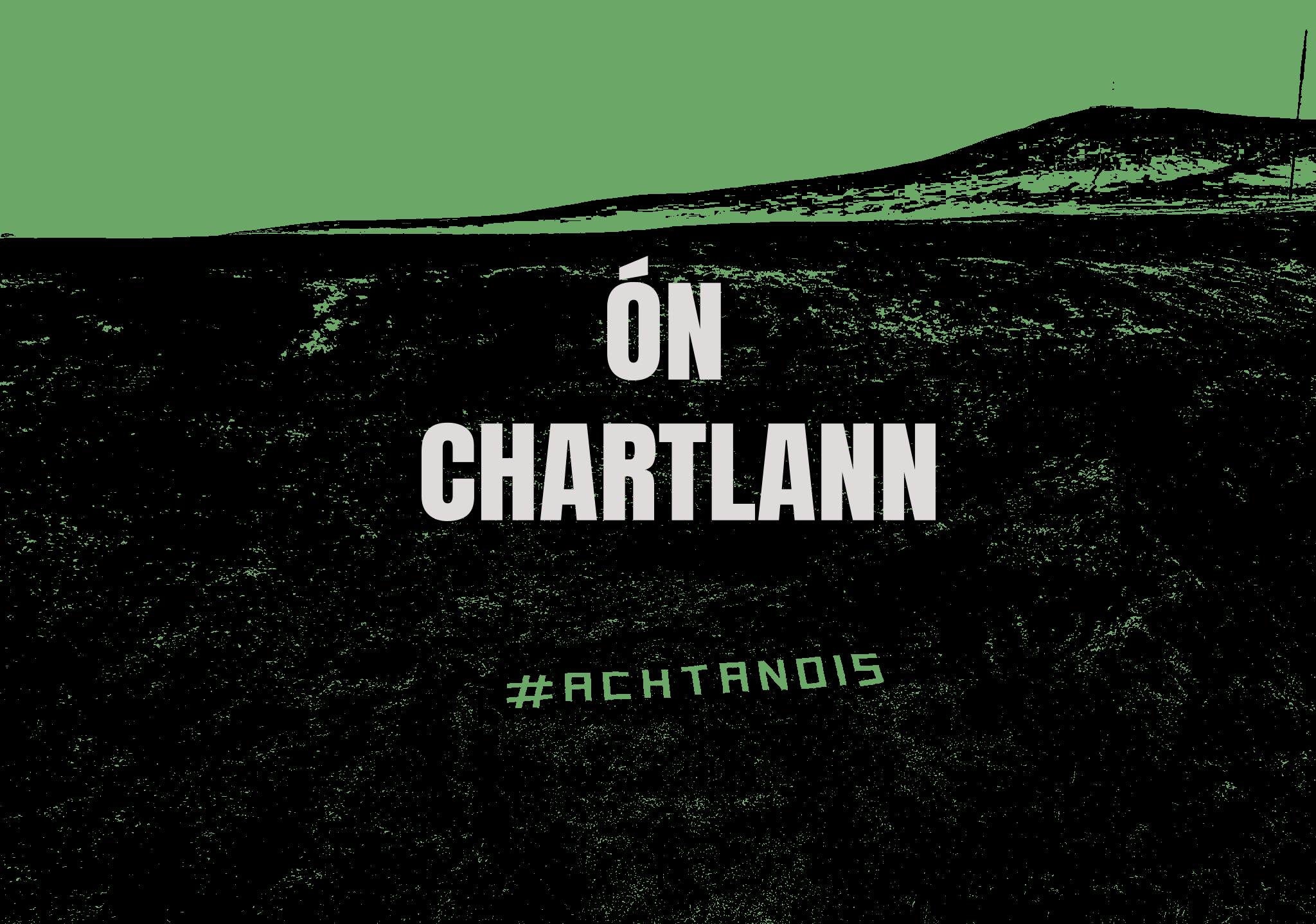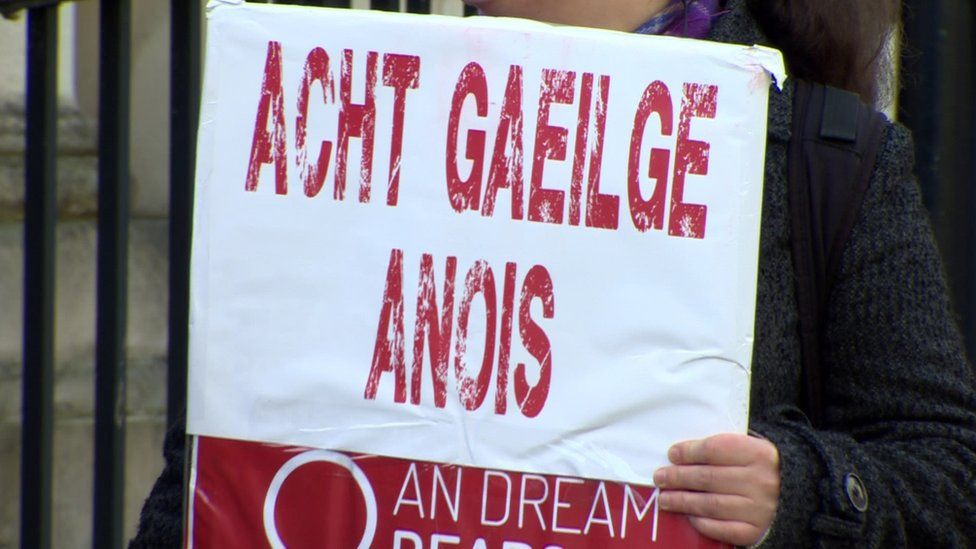An litir dhearg
Bí ar an eolas! Faigh ár nuachtlitir le bheith suas chun dáta leis na feachtais ar fad.

Half a million people should “have knowledge” of Irish and 10% of children should be in Irish-medium education in 20 years time.
That is according to recommendations for an Irish language strategy produced by experts appointed by the Department for Communities (DfC).
A separate strategy document for Ulster-Scots language, heritage and culture recommends GCSEs, A-levels and university degrees in Ulster-Scots.
The strategies are long-term plans.
They focus on the use and promotion of each language in Northern Ireland but remain separate to language laws.
The expert panel reports are the first stage towards development of the language strategies and DfC has now launched a “call for views” on what they have recommended.
Former culture minister Carál Ní Chuilín had launched a draft Irish language strategy in 2015 but that was not adopted by the executive.
Irish language group Conradh na Gaeilge (CnaG) has previously launched a legal challenge against the executive over its failure to introduce an Irish language strategy.
However, language strategies were a commitment in the New Decade New Approach deal.

In mid-2021, Communities Minister Deirdre Hargey appointed two separate expert advisory panels to provide recommendations about what should go into each strategy.
Those panels have now outlined the key actions that should be included in each.
The experts’ recommendations for an Irish Language Strategy include calls for the introduction of language laws, but also a wide range of other measures.
“The Expert Advisory Panel (EAP) recommendations for any future strategy set out, over a period of 20 years, the core action areas that must be delivered in order to enhance, protect and develop the Irish language,” their 100-page document states.
One of the key targets they identify is to grow the number of people who use and speak Irish.
The panel recommends 500,000 people in Northern Ireland “have knowledge” of Irish by 2042.
According to the 2011 NI Census, 184,898 people said they had “some knowledge” of the Irish language - though that included a much higher percentages of Catholics (21%) than Protestants (2%).
The number of people for whom Irish is their “main language” is also expected to rise.
The expansion of Irish-medium education is a key focus of the draft strategy document.
According to the Department of Education, there are more than 7,000 pupils in Irish-medium education in 2021/22 - around 2% of the entire school population.
The experts call for “10% of the wider school population be in Irish-medium education by 2042” - which would equate to about 35,000 pupils.
Parents should “have the right for their children to receive pre-school, primary and post-primary education through the medium of Irish and to have Irish taught to them at all stages of primary and post-primary education”, they state.
That would also mean more Irish-speaking teachers would be trained.
The expert panel also puts forward a wide-range of measures to enhance the status and visibility of the Irish language, especially in public services.
For instance, the number of Irish speakers at senior level in the Civil Service is to be increased, and signs on the buildings of councils and other public bodies should be in Irish and English “with letters of equal size”.
The panel also recommends that museums and tourist attractions, like Titanic Belfast and National Trust properties, provide Irish language tours, signs and information.
The strategy seeks to increase use and knowledge of the language, but also to “increase positive attitudes towards the Irish language in all sections of the community, including the Protestant, unionist and loyalist community.”
Meanwhile, the report from the Ulster-Scots expert panel said Ulster-Scots was “still under-developed and under-appreciated.”
“Some still dismiss and denigrate it,” the document said.
Education also features heavily in the recommendations towards an Ulster-Scots “revival” of language, culture and heritage.
“The panel’s long-term vision for the development of this report has been constructed around an Ulster-Scots child born in 2022,” their report states.
"The milestones in their life should be matched by milestones in the development of Ulster-Scots.
“As this child progresses through every level of the education system (nursery, primary, secondary, tertiary and/or adult education), Ulster-Scots has an ever-growing place in the curriculum and formal studies.”
So, for example, the panel call for the development of Ulster-Scots GCSEs, A-levels and university degrees by 2042.
They also call for a range of other actions including the creation of an Ulster-Scots College and a university-based Ulster-Scots Research Institute.
The panel said there were currently about 1,000 groups in Northern Ireland “currently delivering or supporting Ulster-Scots activity to some level”, including a large number of marching bands.
They called for more funding and more full-time workers in the Ulster-Scots sector, and for councils to introduce more Ulster-Scots signs reflecting place names.
“Resources should be made available to support the development of Ulster-Scots societies on campus at Queen’s University of Belfast, Ulster University and at the right time the major universities in Scotland serving Northern Irish students,” the panel report said.
“This recognises the importance of universities as potential training grounds for future leaders of the sector and influencers in wider society.”
The Irish language expert panel’s five members were Julian de Spáinn, Jake Mac Siacais, Dr Janet Muller, Dr Gabrielle Nig Uidhir and Prof Malachy Ó Néill.
The Ulster-Scots panel was Lee Reynolds, Dr David Hume, Ian Crozier, Helen Mark and Dr Frank Ferguson.
Any final language strategies will, however, have to be agreed by the Stormont Executive.
Bí ar an eolas! Faigh ár nuachtlitir le bheith suas chun dáta leis na feachtais ar fad.